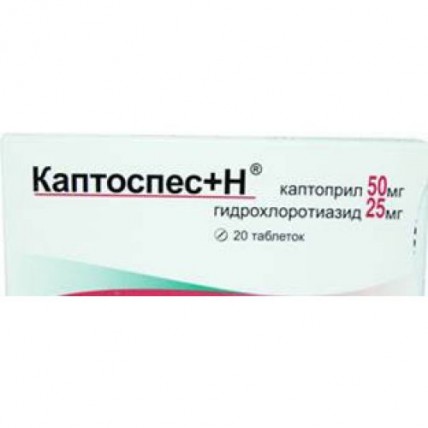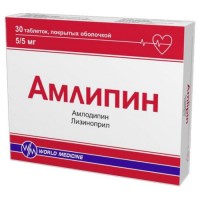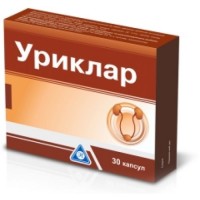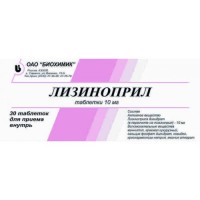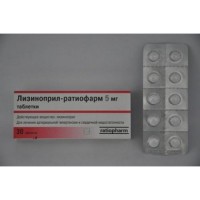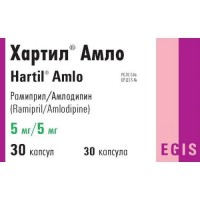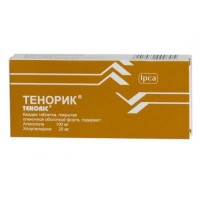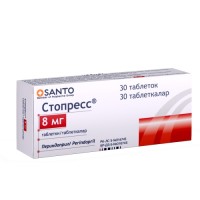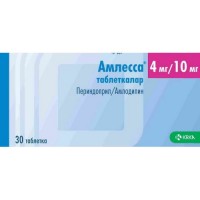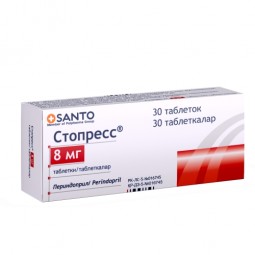The instruction for medical use
of KAPTOSPES+N medicine
the Trade name
Kaptospes +
the International unlicensed name
Is not present N
the Dosage form
of the Tablet Structure One Tablet contains
active agents: captopril of 50.00 mg
hydrochlorothiazide of 25.00 mg,
excipients: microcrystalline cellulose, starch corn prezhelatinizirovanny, lactose anhydrous, stearic acid, magnesium stearate.
The description
of the Tablet of round shape, white color, from risky.
Pharmacotherapeutic group
the Drugs influencing a system renin-angiotezin. AKF inhibitors in a combination with other drugs. AKF inhibitors in a combination with diuretics. Captopril in a combination with diuretics.
The ATX C09BA01 code
the Pharmacological
Pharmacokinetics properties
Captopril is quickly absorbed after intake. The maximum concentration in serum is reached within 1 hour. Minimum value of absorption about 75%. The concomitant use of food
slows down absorption for 30-40%. About 25-30% of captopril contact proteins of plasma. Elimination half-life of captopril makes 2 hours. More than 95% of the absorbed dose are allocated through kidneys within 24 hours, 40-50% of captopril in not changed look, the rest in the form of inactive disulfide metabolites (disulfide of captopril and a disulfide of a tsistinkaptopril).
At cumulation of captopril the renal failure is possible. Researches indicate animals that captopril does not pass through a blood-brain barrier considerably.
The hydrochlorothiazide after intake is quickly soaked up and reaches the maximum concentration in blood in 5-15 hours. The hydrochlorothiazide is removed by kidneys in not changed look (& gt, 95%).
The pharmacodynamics
Kaptospes + N is the combined drug. Has the hypotensive effect caused by activity of active ingredients.
Captopril is a blocker of angiotensin-converting enzyme (APF), reduces Aldosteronum discharge, reduces the general peripheric resistance of vessels, the arterial blood pressure (ABP), a post and preloading. Expands arteries more than veins. Strengthens a coronary and renal blood stream. At prolonged use reduces a hypertrophy of a myocardium and walls of arteries of resistant type, improves blood supply of an ischemic myocardium, reduces aggregation of thrombocytes.
The hydrochlorothiazide thiazide diuretic of average force, reduces a reabsorption of ions of Na at the level of a cortical segment of a Henle's loop, does not affect acid-base balance, lowers the ABP due to change of reactivity of a vascular wall, decrease in pressor influence of vasoconstrictive substances (epinephrine, a norepefin) and strengthenings of depressor influence on vegetative a ganglion (to a lesser extent, due to reduction of OCK), exponentiates hypotensive effect of captopril.
Indications
- arterial hypertension
the Route of administration and doses
of the Dose have to be selected individually according to a clinical picture of a disease.
An initial dose & frac12, tablets of 1 time/days, in the morning when transition from monotherapy to this fixed combination is clinically reasonable. Further if necessary the dose can be increased to the 2nd a tab. / days, or it is reduced to the minimum effective. A pill should be taken irrespective of meal. The expected therapeutic effect occurs completely in 6-8 weeks after an initiation of treatment. Correction of a dose should be carried out with 6 weeks intervals if more rapid change of a dosage is not required.
In a renal failure, at clearance of creatinine from 30 to 80 ml/min. the initial dose usually makes 25/12.5 mg once a day in the morning.
At patients with disturbance of water and electrolytic exchange, at elderly, sick with diabetes, the initial dose makes 25/12.5 mg once a day.
In the absence of side effects the treatment can be carried out during unlimited time. Duration of use is defined by the attending physician.
Side effects
Captopril
Often
- sleep disorders
- disturbances of taste, dizziness
- the dry irritating unproductive cough
- dryness in a mouth, nausea, vomiting, irritation mucous a stomach, abdominal pain, diarrhea, a constipation
- an itching with rash or without rash, skin rash, an alopecia
Infrequently
- tachycardia or a tachyarrhythmia, stenocardia, heartbeat
- hypotension, Reynaud's syndrome, inflows, pallor
- a Quincke's disease
- a stethalgia, fatigue, an indisposition
Is rare
- anorexia
- a somnolence, a headache, paresthesia
- stomatitis / aphthous ulcers, a Quincke's disease of intestines
- a renal failure, including a renal failure, a polyuria, an oliguria, increase in frequency of urination
is Very rare
- a neutropenia/agranulocytosis, a pancytopenia, in particular at patients with dysfunction of kidneys, anemia, including aplastic and hemolytic anemia, thrombocytopenia, an eosinophilia, a lymphadenopathy, autoimmune diseases and/or increase in a caption of anti-nuclear antibodies
- a hyperpotassemia, a hypoglycemia
- concern, a depression
- cerebrovascular disturbances, including a stroke and a faint
- the obscured sight
- cardiac arrest, cardiogenic shock
- a bronchospasm, rhinitis, an allergic alveolitis / eosinophilic pneumonia
- a glossitis, a round ulcer, pancreatitis
- an abnormal liver function and a cholestasia, including jaundice, increase in activity of liver enzymes and bilirubin, hepatitis, up to fulminantny hepatocellular necrosis
- urticaria, Stephens-Johnson's syndrome, a multiformny erythema, a photosensitization, an erythrosis, pemfigoidny reactions, exfoliative dermatitis
- myalgia, an arthralgia
- a nephrotic syndrome
- impotence, a gynecomastia
- fever
- a proteinuria, increase in potassium in blood serum, decrease in level of sodium, increase in urea nitrogen, creatinine and bilirubin in blood serum, decrease in hemoglobin, a hematocrit, quantity of leukocytes, thrombocytes, positive test for anti-nuclear antibodies, increase in SOE
the Hydrochlorothiazide
- a sialadenitis
- a leukopenia, a neutropenia/agranulocytosis, thrombocytopenia, aplastic anemia, hemolytic anemia, oppression of function of marrow
- anorexia, a hyperglycemia, a glucosuria, an electrolytic imbalance, including a hyponatremia and a hypopotassemia, increase in cholesterol and triglycerides
- concern, a depression, sleep disorders
- loss of appetite, paresthesia, slight dizziness
- a xanthopsia, tranzitorny misting of sight
- vertigo
- postural hypotension, cardiac arrhythmias
- a necrotizing angiitis (a vasculitis, a skin vasculitis)
- a respiratory distress syndrome, including a pneumonitis and a fluid lungs
- irritation mucous a stomach, diarrhea, a constipation, pancreatitis
- jaundice (intra hepatic cholestatic jaundice)
- reactions of a photosensitization, rash, skin volchanochnopodobny erythematic reaction, reactivation of a skin erythematic lupus, urticaria, anaphylactic reactions, a toxic epidermal necrolysis
- a muscular spasm
- a renal failure, interstitial nephrite
- fever, weakness
of the Contraindication
- hypersensitivity to active or auxiliary components of drug, or to other APF inhibitors, or other sulfonamides
- the Quincke's disease in the anamnesis connected with the previous treatment by APF inhibitors
- a hereditary/idiopathic Quincke's disease
- a bilateral stenosis of renal arteries or a stenosis of arteries of the only kidney with the progressing azotemia
- a stenosis of the mouth of an aorta
- arterial hypotension
- a state after transplantation of a kidney
- a heavy renal failure (clearance of creatinine less than 30 ml/min.)
- heavy insufficiency of function of a liver
- the period of pregnancy and a lactation
- children's and teenage age up to 18 years
Medicinal interactions
Captopril
Kaliysberegayushchy diuretics (Triamterenum, amiloride and Spironolactonum) or potassium additives: can lead to noticeable increase in concentration potassium in blood plasma.
Diuretics (tiazida or loopback diuretics): enhance expressiveness of hypotensive effect.
Other antihypertensive drugs: captopril should be applied with care with other antihypertensive drugs (beta blockers, blockers of slow calcium channels and others) as at combined use the expressiveness of hypotensive effect amplifies. It is necessary to use nitroglycerine and other nitrates, or other vazodilatator with care.
Alpha adrenoblockers: combined use with alpha adrenoblockers leads to increase in antihypertensive effect of captopril and increases risk of orthostatic hypotension.
Treatment of an acute myocardial infarction: captopril can be applied together with acetylsalicylic acid (in cardiological doses), trombolitika, beta blockers and/or nitrates at patients with a myocardial infarction.
Tricyclic antidepressants / antipsychotic means: APF inhibitors can change hypotensive effect of some tricyclic antidepressants and antipsychotic means. Postural hypotension is possible.
Allopyrinolum, procaineamide, cytostatics or immunodepressants: combined use with APF inhibitors can lead to increase in risk of a leukopenia, especially when using in the doses exceeding recommended.
Sympathomimetics, pressor amines (for example, noradrenaline): reduce antihypertensive effect of APF inhibitors, patients have to be under careful medical control.
Anti-diabetic drugs: pharmacological researches showed that APF inhibitors, including captopril can exponentiate hypoglycemic effect of insulin and oral anti-diabetic means, such as sulphonylurea derivatives. Seldom or never at combined use with APF inhibitors there can be a need of reduction of a dose of anti-diabetic means.
Cimetidinum, slowing down metabolism of captopril in a liver, increases its concentration in plasma.
Hydrochlorothiazide
Amphotericinum B, karbenoksolon, corticosteroids and corticotropin (AKTG): in combination with Hydrochlorthiazidum can strengthen disturbance of electrolytic balance, especially a hypopotassemia.
Calcium salts: in the presence of thiazide diuretics the concentration of calcium in blood can increase due to reduction of its removal from an organism.
Cardiac glycosides: the toxicity of drugs of a digitalis can increase against the background of the hypopotassemia caused by a hydrochlorothiazide.
Holestiramin and kolestipol: can detain or reduce absorbability of a hydrochlorothiazide. Sulphonamide diuretics should be accepted, at least, in one hour prior to these drugs or in 4-6 hours after their reception.
The drugs causing torsades de pointes: in connection with risk of development of a hypopotassemia it is necessary to be careful at combined use of a hydrochlorothiazide with the medicines causing arrhythmia like torsades de pointes such as some antiarrhytmic and antipsychotic means and others.
Carbamazepine: combined use of carbamazepine and a hydrochlorothiazide is connected with risk of development of a symptomatic hyponatremia. At their combined use it is necessary to monitorirovat the content of electrolytes in blood. It is whenever possible necessary to use diuretics of other group.
Oral anticoagulants. Correction of a dose of anticoagulants as the hydrochlorothiazide can suppress their action can be required.
Drugs for treatment of gout. Correction of a dose of drugs for treatment of gout as the hydrochlorothiazide can increase concentration of uric acid can be required.
Anti-diabetic drugs (peroral and insulin). The hydrochlorothiazide can increase concentration of glucose in blood therefore correction of a dose of anti-diabetic drugs can be required.
Diazoxide increases hyper glycemic, giperurikemichesky and antihypertensive action at simultaneous use with a hydrochlorothiazide. It is necessary to control glucose content in blood and concentration of uric acid.
Methenamin can reduce action of a hydrochlorothiazide because of increase in alkali reaction of urine.
Combination captopril/hydrochlorothiazide
of Lities: simultaneous use of APF inhibitors with salts of lithium can lead to increase in concentration of lithium in blood plasma, to decrease in renal clearance of lithium and increase in toxic effects of drugs of lithium.
Non-steroidal anti-inflammatory drugs: non-steroidal anti-inflammatory drugs (NPVS) and APF inhibitors show additive effect concerning increase in potassium in blood serum whereas function of kidneys can be reduced. These effects, in principle, are reversible. In rare instances the acute renal failure can develop, especially patients with risk factors have renal failures: elderly or patients with dehydration. Prolonged use of NPVS can reduce antihypertensive effect of APF inhibitors. Use of NPVS can reduce diuretic, natriuretic and antihypertensive effect of thiazide diuretics.
The anti-depolarizing muscle relaxants, drugs for an introduction anesthesia and the general anesthetics applied in surgery. Effect of these drugs can amplify a hydrochlorothiazide. Correction of a dose and water-salt balance before carrying out surgery can be required. It is necessary to cancel the drug treatment Kaptospes + H in a week prior to surgery.
Alcohol, barbiturates and drugs can strengthen orthostatic hypotension.
The combination with MAO inhibitors enhances expressiveness of hypotensive effect.
Special
instructions Captopril Hypotension: it is seldom observed at patients with uncomplicated arterial hypertension.
Symptomatic hypotension is more probable at patients with arterial hypertension with a reduced volume of the circulating blood and/or concentration of sodium owing to vigorous diuretic therapy, patients with restriction have salts in a diet, diarrhea, vomiting or being on a hemodialysis. The volume of the circulating blood and/or concentration of sodium in blood have to be modified before using drug, it is necessary to consider reception of lower initial dose Kaptospes + N.
As well as at use of other antihypertensive drugs at reception Kaptospes + N perhaps excessive lowering of arterial pressure at patients with coronary heart disease or an ischemic cerebrovascular disease that can lead to increase in risk of a myocardial infarction or stroke. In case of development of arterial hypotension the patient has to be turned to a dorsal decubitus. Substitution of volume of the circulating blood intravenous administration of saline solutions can be required.
Renovascular hypertensia: at use of APF inhibitors to patients with a bilateral renal artery stenosis or a stenosis of an artery of the only functioning kidney the risk of developing heavy arterial hypotension and renal failure increases (concentration of urea and creatinine in blood serum increases).
Quincke's disease: it was reported about cases of development of a Quincke's disease of the face, extremities, lips, language, a glottis and/or throat at the patients receiving APF inhibitors including captopril. The Quincke's disease can occur the Kaptospes drug treatment + N.V such cases administration of drug at any time control of a condition of the patient before full elimination of clinical symptoms of hypostasis has to be immediately stopped, established, if necessary the corresponding treatment has to be appointed. The state most often undergoes in cases when hypostasis arose only on a face and lips, without treatment, however, perhaps prescribing of antihistaminic drugs.
The Quincke's disease of a throat can be fatal. In the paraglossa, a glottis or a throat complicating intake of air in an organism the corresponding therapy which can include hypodermic administration of adrenaline 1 is required: 1000 (0.3 - 0.5 ml) and/or measures for ensuring passability of airways.
At patients who in the anamnesis already had a Quincke's disease which is not connected with the previous treatment by APF inhibitors, can be raised risk of its development during treatment by APF inhibitor.
Patients have rare messages about cases of a Quincke's disease of intestines in connection with use of APF inhibitors. At patients the abdominal pain (was noted with or without nausea or vomiting), in some cases there was no previous angioedema of the person and the activity of C-1 of esterase was normal. The Quincke's disease was diagnosed by method of a computer tomography or ultrasonic inspection of an abdominal cavity, or during surgical intervention, symptoms of hypostasis stopped after APF inhibitor cancellation. The Quincke's disease of intestines has to be included in differential diagnostics of an abdominal pain at the patients receiving APF inhibitors.
There are messages that at African-American patients receiving APF inhibitors, the frequency of development of a Quincke's disease is higher, in comparison with the non African Americans.
Cough: when prescribing APF inhibitors there is unproductive persistent cough which passes after the therapy termination.
Liver failure: very seldom APF inhibitors cause cholestatic jaundice or hepatitis, up to fulminantny hepatocellular necrosis, sometimes with a fatal outcome. The mechanism of these complications is unknown. Patients at whom jaundice or increase in level of liver enzymes develops should stop administration of drug Kaptospes + N and to receive the corresponding therapy.
Hyperpotassemia: at some patients the increase in level of potassium in blood serum at use of APF inhibitors, including captopril was observed. Risk of development of a hyperpotassemia is increased at patients with insufficiency of function of kidneys, diabetes, at combined use with kaliysberegayushchy diuretics, kaliysoderzhashchy additives or substitutes of salt, or at the patients taking other drugs causing increase in potassium in serum (for example, heparin). At the accompanying use of above-mentioned means it is regularly necessary to control potassium content in blood serum.
Stenosis of aortal and mitral valves / subaortic hypertrophic stenosis / cardiogenic shock: APF inhibitors should be applied with care at patients with obstruction of the valve of a left ventricle and the taking-out path of a left ventricle and also it is not necessary to apply in cases of cardiogenic shock and hemodynamically significant obstruction.
Neutropenia/agranulocytosis: the neutropenia/agranulocytosis, thrombocytopenia and anemia are observed at the patients receiving APF inhibitors including captopril. At patients with normal function of kidneys and in the absence of other complicating factors, the neutropenia develops seldom. Drug should be used with extra care at patients with the autoimmune diseases receiving immunodepressants, Allopyrinolum or procaineamide or a combination of these factors, especially at the previous insufficiency of function of kidneys. At some patients the development of serious infections which in certain cases do not respond to intensive antibacterial care is possible. When using captopril at such patients the control of level of leukocytes in blood prior to treatment is recommended, then each 2 weeks within the first 3 months of administration of drug and periodically further
during treatment all patients have to report about any symptoms of an infection (such as, for example, tonsillitis, fever). Captopril and other accompanying treatment it has to be cancelled if the neutropenia is established (neutrophils less than 1000/mm3) or it is suspected. In most cases the quantity of neutrophils at patients quickly is restored to normal level at the termination of intake of captopril.
Proteinuria: develops at patients with the available renal failure or when using rather high doses of APF inhibitors more often.
Content of crude protein in urine more than 1 g, were it is noted approximately at 0.7% of the patients receiving captopril. Most of patients had a previous disease of kidneys or they used rather high doses of captopril (more than 150 mg/day), or both factors took place. Approximately at 1/5 patients the nephrotic syndrome developed. Parameters of renal function, such as urea nitrogen in blood and creatinine, seldom changed at patients with a proteinuria.
At patients the urine protein content has to decide on the previous disease of kidneys (in the first morning portion) before treatment and, periodically, in the course of treatment.
Anaphylactoid reactions during a desensitization: the patients who underwent desensitization against poisons of insects who received other APF inhibitors have rare messages about long life-threatening anaphylactoid reactions. It can be avoided the temporary termination of intake of APF inhibitor. It is necessary to be careful when holding such hyposensibilizing procedures at the patients accepting APF inhibitors.
Anaphylactoid reactions at the patients who are on a hemodialysis:
it was reported about anaphylactoid reactions at the patients who are on dialysis with high-permeability membranes, and accepting the accompanying treatment by APF inhibitor. For such patients the possibility of use of a dialysis membrane of other type or other group of antihypertensive drugs has to be considered.
Anaphylactoid reactions during an aferez of LDL: at co-administration of captopril and dialysis about polyacrylic - a nitrile membrane or LPNP-afereza by means of sulfate of a dextran the development of life-threatening anaphylactoid reactions is possible (including an acute anaphylaxis).
It is recommended to use other membrane for dialysis or it is necessary to replace temporarily captopril with other antihypertensive drugs (not APF inhibitors).
Surgical intervention / anesthesia: there can be arterial hypotension at patients at extensive surgeries or in case of use of anesthetics to hypotensive effect. Hypotension can be eliminated by completion of volume of the circulating blood.
Before surgical intervention (including stomatology) it is necessary to warn the surgeon/anaesthesiologist about use of APF inhibitors.
Patients with diabetes: it is necessary to control carefully glycemia level at the patients with diabetes who were earlier receiving oral anti-diabetic drugs or insulin namely within the first month of treatment by captopril.
Hydrochlorothiazide
Renal failure: at patients with diseases of kidneys of a tiazida can accelerate development of an azotemia, in a renal failure cumulative effects of drug can develop. If deterioration in function of kidneys progresses and is characterized by increase in content of nonprotein nitrogen, it is necessary to reconsider carefully treatment of the patient with possible cancellation of diuretic. In case of a renal failure (КК<, 80 ml/min.), an initial dose Kaptospes + has to be established to N according to the patient's KK, and then depending on reaction of the patient to treatment. At such patients it is necessary to watch the level of potassium and creatinine in blood serum.
Liver failure: the hydrochlorothiazide should be applied with care in diseases of a liver or at patients with the progressing liver disease as drug can cause an intra hepatic cholestasia, and the slightest changes in water-salt balance can provoke development of a hepatic coma. The hydrochlorothiazide is contraindicated to patients with a serious illness of a liver.
Metabolic and endocrine disturbances: treatment of a tiazidama can reduce tolerance of glucose. Dose adjustment of antidiabetic means, including insulin can be required. During treatment of a tiazidama the latent diabetes can be shown.
Increase in cholesterol and triglycerides can be connected with diuretic therapy by a hydrochlorothiazide.
Treatment by a hydrochlorothiazide can cause a hyperuricemia and/or gout in some patients.
Electrolytic imbalance: it is necessary to control periodically the level of electrolytes in serum. Tiazidy, including a hydrochlorothiazide, can cause a water-salt imbalance (hypopotassemia, a hyponatremia and a gipokhloremichesky alkalosis). Patients have to be under observation for the purpose of identification of clinical signs of a water-salt imbalance (for example, dryness in a mouth, thirst, weakness, a lethargy, drowsiness, concern, muscular pains or spasms, muscle weakness, hypotension, tachycardia, an oliguria, gastrointestinal disorders, such as nausea or vomiting).
The hypopotassemia can develop when using thiazide diuretics, however combined use with captopril reduces the hypopotassemia phenomena. The risk of a hypopotassemia is especially increased at patients with cirrhosis, with a profound diuresis, at patients with inadequate oral consumption of electrolytes and at the patients receiving the accompanying therapy by corticosteroids or AKTG.
In warm season the patients with hypostases can have an euvolemichesky hyponatremia. The deficiency of chlorine, in general, moderate and usually does not demand treatment.
Tiazida can reduce removal of calcium with urine and to become the reason of temporary and slight increase of level of calcium in blood serum, without causing the known disturbances of metabolism of calcium. The expressed hypercalcemia can be symptom of the latent hyperparathyreosis. Reception of tiazid has to be stopped before inspection of function of epithelial bodies.
Tiazida increase renal excretion of magnesium that can lead to a hypomagnesiemia.
Anti-doping test: the hydrochlorothiazide can result in positive analytical take in the test of anti-doping.
Other: reactions of sensitivity can happen at patients to an allergy or bronchial asthma, including in the anamnesis. There are messages about a possibility of activation of a system volchanochnopodobny eritematoz.
Combination captopril/hydrochlorothiazide
Pregnancy: APF inhibitors are contraindicated at pregnancy. The patients receiving APF inhibitors and planning pregnancy need to appoint alternative antihypertensive drugs with the established safety profile for use during pregnancy. If pregnancy is established, treatment by APF inhibitors has to be immediately stopped and if it is necessary, alternative therapy has to be begun.
Risk of a hypopotassemia: the combination of APF inhibitors with thiazide diuretics does not exclude development of a hypopotassemia. It is regularly necessary to control potassium content in blood serum.
A combination with lithium: combined use Kaptospes + is not recommended to N with lithium because of potentiation of toxicity of lithium.
Lactose: drug should not be used at patients with hereditary intolerance of a galactose, deficit of Lapp-laktazy or malabsorption of a glucose/galactose.
With extra care it is necessary to appoint Kaptospes + N in moderate renal failures (serum creatinine less than 1.8 mg / 100 by ml or KK of 30-60 ml/min.), collagenoses and other autoimmune diseases (system lupus erythematosus, a scleroderma, a nodular periarteritis), at elderly patients (65 years are more senior). In these cases especially careful control of the ABP level and laboratory indicators is required.
In an initiation of treatment Kaptospesy + the N can be observed excessive decrease in the ABP, especially at patients with heart failure, a severe form of arterial hypertension (including, renal origin) and/or a renal failure.
It is necessary to begin treatment of arterial hypertension with usual captopril.
Before an initiation of treatment Kaptospesy + the N needs to carry out correction of water-salt balance (to reduce a dose of the diuretics appointed earlier or, in some cases, completely to cancel them).
Before an initiation of treatment it is necessary to carry out control of function of kidneys.
The feature of influence of medicine on ability to run the vehicle or potentially dangerous mechanisms
during treatment should refrain from occupations potentially dangerous activity demanding concentration of attention and speed of psychomotor reactions.
Overdose
Symptoms: the raised diuresis, an electrolytic imbalance, a severe form of hypotension, a depression (including coma), spasms, paresis, disturbances of a heart rhythm, bradycardia, a renal failure.
Treatment: gastric lavage, reception of the adsorbing agents and sodium of sulfate within 30 minutes.
In hypotension it is necessary to lay the patient in horizontal position, having slightly raised legs and to immediately enter sodium chloride. Treatment angioteziny II is possible. Bradycardia or considerable vagal reaction is treated by administration of atropine. Use of a pacemaker can be considered. Continuous monitoring of water, electrolytic and acid-base balance, glucose in blood is important. In case of a hypopotassemia, performing replacement therapy is necessary.
Captopril can be removed from an organism by means of a hemodialysis. Extent of removal of a hydrochlorothiazide is not established by a hemodialysis.
The form of release and packing
On 10 tablets place in blister strip packaging from a film of polyvinylchloride and aluminum foil.
On the 2nd blister strip packaging together with the instruction for medical use in the state and Russian languages place in a pack from cardboard.
To Store storage conditions in the dry, protected from light place, at
a temperature not higher than 25 S. Hranit out of children's reach!
3 years
not to use a period of storage after the expiration date specified on packing.
Prescription status
According to the prescription
SPECIFAR S.A Producer.
1, 28-th Octovrio str,
123 51 Athens, Greece
the Owner of the registration certificate
of ALET PHARMACEUTICALS S.A., 31-33, Athinon Avenue,
104 47, Athens, Greece
To develop the Address of the organization accepting in the territory of the Republic of Kazakhstan claims from consumers on quality of products (goods) of TOO KFK Medservice Plus of RK, Almaty, Mametova St., 54 Ph.: +7 (727) 2334154
of KAPTOSPES+N medicine
the Trade name
Kaptospes +
the International unlicensed name
Is not present N
the Dosage form
of the Tablet Structure One Tablet contains
active agents: captopril of 50.00 mg
hydrochlorothiazide of 25.00 mg,
excipients: microcrystalline cellulose, starch corn prezhelatinizirovanny, lactose anhydrous, stearic acid, magnesium stearate.
The description
of the Tablet of round shape, white color, from risky.
Pharmacotherapeutic group
the Drugs influencing a system renin-angiotezin. AKF inhibitors in a combination with other drugs. AKF inhibitors in a combination with diuretics. Captopril in a combination with diuretics.
The ATX C09BA01 code
the Pharmacological
Pharmacokinetics properties
Captopril is quickly absorbed after intake. The maximum concentration in serum is reached within 1 hour. Minimum value of absorption about 75%. The concomitant use of food
slows down absorption for 30-40%. About 25-30% of captopril contact proteins of plasma. Elimination half-life of captopril makes 2 hours. More than 95% of the absorbed dose are allocated through kidneys within 24 hours, 40-50% of captopril in not changed look, the rest in the form of inactive disulfide metabolites (disulfide of captopril and a disulfide of a tsistinkaptopril).
At cumulation of captopril the renal failure is possible. Researches indicate animals that captopril does not pass through a blood-brain barrier considerably.
The hydrochlorothiazide after intake is quickly soaked up and reaches the maximum concentration in blood in 5-15 hours. The hydrochlorothiazide is removed by kidneys in not changed look (& gt, 95%).
The pharmacodynamics
Kaptospes + N is the combined drug. Has the hypotensive effect caused by activity of active ingredients.
Captopril is a blocker of angiotensin-converting enzyme (APF), reduces Aldosteronum discharge, reduces the general peripheric resistance of vessels, the arterial blood pressure (ABP), a post and preloading. Expands arteries more than veins. Strengthens a coronary and renal blood stream. At prolonged use reduces a hypertrophy of a myocardium and walls of arteries of resistant type, improves blood supply of an ischemic myocardium, reduces aggregation of thrombocytes.
The hydrochlorothiazide thiazide diuretic of average force, reduces a reabsorption of ions of Na at the level of a cortical segment of a Henle's loop, does not affect acid-base balance, lowers the ABP due to change of reactivity of a vascular wall, decrease in pressor influence of vasoconstrictive substances (epinephrine, a norepefin) and strengthenings of depressor influence on vegetative a ganglion (to a lesser extent, due to reduction of OCK), exponentiates hypotensive effect of captopril.
Indications
- arterial hypertension
the Route of administration and doses
of the Dose have to be selected individually according to a clinical picture of a disease.
An initial dose & frac12, tablets of 1 time/days, in the morning when transition from monotherapy to this fixed combination is clinically reasonable. Further if necessary the dose can be increased to the 2nd a tab. / days, or it is reduced to the minimum effective. A pill should be taken irrespective of meal. The expected therapeutic effect occurs completely in 6-8 weeks after an initiation of treatment. Correction of a dose should be carried out with 6 weeks intervals if more rapid change of a dosage is not required.
In a renal failure, at clearance of creatinine from 30 to 80 ml/min. the initial dose usually makes 25/12.5 mg once a day in the morning.
At patients with disturbance of water and electrolytic exchange, at elderly, sick with diabetes, the initial dose makes 25/12.5 mg once a day.
In the absence of side effects the treatment can be carried out during unlimited time. Duration of use is defined by the attending physician.
Side effects
Captopril
Often
- sleep disorders
- disturbances of taste, dizziness
- the dry irritating unproductive cough
- dryness in a mouth, nausea, vomiting, irritation mucous a stomach, abdominal pain, diarrhea, a constipation
- an itching with rash or without rash, skin rash, an alopecia
Infrequently
- tachycardia or a tachyarrhythmia, stenocardia, heartbeat
- hypotension, Reynaud's syndrome, inflows, pallor
- a Quincke's disease
- a stethalgia, fatigue, an indisposition
Is rare
- anorexia
- a somnolence, a headache, paresthesia
- stomatitis / aphthous ulcers, a Quincke's disease of intestines
- a renal failure, including a renal failure, a polyuria, an oliguria, increase in frequency of urination
is Very rare
- a neutropenia/agranulocytosis, a pancytopenia, in particular at patients with dysfunction of kidneys, anemia, including aplastic and hemolytic anemia, thrombocytopenia, an eosinophilia, a lymphadenopathy, autoimmune diseases and/or increase in a caption of anti-nuclear antibodies
- a hyperpotassemia, a hypoglycemia
- concern, a depression
- cerebrovascular disturbances, including a stroke and a faint
- the obscured sight
- cardiac arrest, cardiogenic shock
- a bronchospasm, rhinitis, an allergic alveolitis / eosinophilic pneumonia
- a glossitis, a round ulcer, pancreatitis
- an abnormal liver function and a cholestasia, including jaundice, increase in activity of liver enzymes and bilirubin, hepatitis, up to fulminantny hepatocellular necrosis
- urticaria, Stephens-Johnson's syndrome, a multiformny erythema, a photosensitization, an erythrosis, pemfigoidny reactions, exfoliative dermatitis
- myalgia, an arthralgia
- a nephrotic syndrome
- impotence, a gynecomastia
- fever
- a proteinuria, increase in potassium in blood serum, decrease in level of sodium, increase in urea nitrogen, creatinine and bilirubin in blood serum, decrease in hemoglobin, a hematocrit, quantity of leukocytes, thrombocytes, positive test for anti-nuclear antibodies, increase in SOE
the Hydrochlorothiazide
- a sialadenitis
- a leukopenia, a neutropenia/agranulocytosis, thrombocytopenia, aplastic anemia, hemolytic anemia, oppression of function of marrow
- anorexia, a hyperglycemia, a glucosuria, an electrolytic imbalance, including a hyponatremia and a hypopotassemia, increase in cholesterol and triglycerides
- concern, a depression, sleep disorders
- loss of appetite, paresthesia, slight dizziness
- a xanthopsia, tranzitorny misting of sight
- vertigo
- postural hypotension, cardiac arrhythmias
- a necrotizing angiitis (a vasculitis, a skin vasculitis)
- a respiratory distress syndrome, including a pneumonitis and a fluid lungs
- irritation mucous a stomach, diarrhea, a constipation, pancreatitis
- jaundice (intra hepatic cholestatic jaundice)
- reactions of a photosensitization, rash, skin volchanochnopodobny erythematic reaction, reactivation of a skin erythematic lupus, urticaria, anaphylactic reactions, a toxic epidermal necrolysis
- a muscular spasm
- a renal failure, interstitial nephrite
- fever, weakness
of the Contraindication
- hypersensitivity to active or auxiliary components of drug, or to other APF inhibitors, or other sulfonamides
- the Quincke's disease in the anamnesis connected with the previous treatment by APF inhibitors
- a hereditary/idiopathic Quincke's disease
- a bilateral stenosis of renal arteries or a stenosis of arteries of the only kidney with the progressing azotemia
- a stenosis of the mouth of an aorta
- arterial hypotension
- a state after transplantation of a kidney
- a heavy renal failure (clearance of creatinine less than 30 ml/min.)
- heavy insufficiency of function of a liver
- the period of pregnancy and a lactation
- children's and teenage age up to 18 years
Medicinal interactions
Captopril
Kaliysberegayushchy diuretics (Triamterenum, amiloride and Spironolactonum) or potassium additives: can lead to noticeable increase in concentration potassium in blood plasma.
Diuretics (tiazida or loopback diuretics): enhance expressiveness of hypotensive effect.
Other antihypertensive drugs: captopril should be applied with care with other antihypertensive drugs (beta blockers, blockers of slow calcium channels and others) as at combined use the expressiveness of hypotensive effect amplifies. It is necessary to use nitroglycerine and other nitrates, or other vazodilatator with care.
Alpha adrenoblockers: combined use with alpha adrenoblockers leads to increase in antihypertensive effect of captopril and increases risk of orthostatic hypotension.
Treatment of an acute myocardial infarction: captopril can be applied together with acetylsalicylic acid (in cardiological doses), trombolitika, beta blockers and/or nitrates at patients with a myocardial infarction.
Tricyclic antidepressants / antipsychotic means: APF inhibitors can change hypotensive effect of some tricyclic antidepressants and antipsychotic means. Postural hypotension is possible.
Allopyrinolum, procaineamide, cytostatics or immunodepressants: combined use with APF inhibitors can lead to increase in risk of a leukopenia, especially when using in the doses exceeding recommended.
Sympathomimetics, pressor amines (for example, noradrenaline): reduce antihypertensive effect of APF inhibitors, patients have to be under careful medical control.
Anti-diabetic drugs: pharmacological researches showed that APF inhibitors, including captopril can exponentiate hypoglycemic effect of insulin and oral anti-diabetic means, such as sulphonylurea derivatives. Seldom or never at combined use with APF inhibitors there can be a need of reduction of a dose of anti-diabetic means.
Cimetidinum, slowing down metabolism of captopril in a liver, increases its concentration in plasma.
Hydrochlorothiazide
Amphotericinum B, karbenoksolon, corticosteroids and corticotropin (AKTG): in combination with Hydrochlorthiazidum can strengthen disturbance of electrolytic balance, especially a hypopotassemia.
Calcium salts: in the presence of thiazide diuretics the concentration of calcium in blood can increase due to reduction of its removal from an organism.
Cardiac glycosides: the toxicity of drugs of a digitalis can increase against the background of the hypopotassemia caused by a hydrochlorothiazide.
Holestiramin and kolestipol: can detain or reduce absorbability of a hydrochlorothiazide. Sulphonamide diuretics should be accepted, at least, in one hour prior to these drugs or in 4-6 hours after their reception.
The drugs causing torsades de pointes: in connection with risk of development of a hypopotassemia it is necessary to be careful at combined use of a hydrochlorothiazide with the medicines causing arrhythmia like torsades de pointes such as some antiarrhytmic and antipsychotic means and others.
Carbamazepine: combined use of carbamazepine and a hydrochlorothiazide is connected with risk of development of a symptomatic hyponatremia. At their combined use it is necessary to monitorirovat the content of electrolytes in blood. It is whenever possible necessary to use diuretics of other group.
Oral anticoagulants. Correction of a dose of anticoagulants as the hydrochlorothiazide can suppress their action can be required.
Drugs for treatment of gout. Correction of a dose of drugs for treatment of gout as the hydrochlorothiazide can increase concentration of uric acid can be required.
Anti-diabetic drugs (peroral and insulin). The hydrochlorothiazide can increase concentration of glucose in blood therefore correction of a dose of anti-diabetic drugs can be required.
Diazoxide increases hyper glycemic, giperurikemichesky and antihypertensive action at simultaneous use with a hydrochlorothiazide. It is necessary to control glucose content in blood and concentration of uric acid.
Methenamin can reduce action of a hydrochlorothiazide because of increase in alkali reaction of urine.
Combination captopril/hydrochlorothiazide
of Lities: simultaneous use of APF inhibitors with salts of lithium can lead to increase in concentration of lithium in blood plasma, to decrease in renal clearance of lithium and increase in toxic effects of drugs of lithium.
Non-steroidal anti-inflammatory drugs: non-steroidal anti-inflammatory drugs (NPVS) and APF inhibitors show additive effect concerning increase in potassium in blood serum whereas function of kidneys can be reduced. These effects, in principle, are reversible. In rare instances the acute renal failure can develop, especially patients with risk factors have renal failures: elderly or patients with dehydration. Prolonged use of NPVS can reduce antihypertensive effect of APF inhibitors. Use of NPVS can reduce diuretic, natriuretic and antihypertensive effect of thiazide diuretics.
The anti-depolarizing muscle relaxants, drugs for an introduction anesthesia and the general anesthetics applied in surgery. Effect of these drugs can amplify a hydrochlorothiazide. Correction of a dose and water-salt balance before carrying out surgery can be required. It is necessary to cancel the drug treatment Kaptospes + H in a week prior to surgery.
Alcohol, barbiturates and drugs can strengthen orthostatic hypotension.
The combination with MAO inhibitors enhances expressiveness of hypotensive effect.
Special
instructions Captopril Hypotension: it is seldom observed at patients with uncomplicated arterial hypertension.
Symptomatic hypotension is more probable at patients with arterial hypertension with a reduced volume of the circulating blood and/or concentration of sodium owing to vigorous diuretic therapy, patients with restriction have salts in a diet, diarrhea, vomiting or being on a hemodialysis. The volume of the circulating blood and/or concentration of sodium in blood have to be modified before using drug, it is necessary to consider reception of lower initial dose Kaptospes + N.
As well as at use of other antihypertensive drugs at reception Kaptospes + N perhaps excessive lowering of arterial pressure at patients with coronary heart disease or an ischemic cerebrovascular disease that can lead to increase in risk of a myocardial infarction or stroke. In case of development of arterial hypotension the patient has to be turned to a dorsal decubitus. Substitution of volume of the circulating blood intravenous administration of saline solutions can be required.
Renovascular hypertensia: at use of APF inhibitors to patients with a bilateral renal artery stenosis or a stenosis of an artery of the only functioning kidney the risk of developing heavy arterial hypotension and renal failure increases (concentration of urea and creatinine in blood serum increases).
Quincke's disease: it was reported about cases of development of a Quincke's disease of the face, extremities, lips, language, a glottis and/or throat at the patients receiving APF inhibitors including captopril. The Quincke's disease can occur the Kaptospes drug treatment + N.V such cases administration of drug at any time control of a condition of the patient before full elimination of clinical symptoms of hypostasis has to be immediately stopped, established, if necessary the corresponding treatment has to be appointed. The state most often undergoes in cases when hypostasis arose only on a face and lips, without treatment, however, perhaps prescribing of antihistaminic drugs.
The Quincke's disease of a throat can be fatal. In the paraglossa, a glottis or a throat complicating intake of air in an organism the corresponding therapy which can include hypodermic administration of adrenaline 1 is required: 1000 (0.3 - 0.5 ml) and/or measures for ensuring passability of airways.
At patients who in the anamnesis already had a Quincke's disease which is not connected with the previous treatment by APF inhibitors, can be raised risk of its development during treatment by APF inhibitor.
Patients have rare messages about cases of a Quincke's disease of intestines in connection with use of APF inhibitors. At patients the abdominal pain (was noted with or without nausea or vomiting), in some cases there was no previous angioedema of the person and the activity of C-1 of esterase was normal. The Quincke's disease was diagnosed by method of a computer tomography or ultrasonic inspection of an abdominal cavity, or during surgical intervention, symptoms of hypostasis stopped after APF inhibitor cancellation. The Quincke's disease of intestines has to be included in differential diagnostics of an abdominal pain at the patients receiving APF inhibitors.
There are messages that at African-American patients receiving APF inhibitors, the frequency of development of a Quincke's disease is higher, in comparison with the non African Americans.
Cough: when prescribing APF inhibitors there is unproductive persistent cough which passes after the therapy termination.
Liver failure: very seldom APF inhibitors cause cholestatic jaundice or hepatitis, up to fulminantny hepatocellular necrosis, sometimes with a fatal outcome. The mechanism of these complications is unknown. Patients at whom jaundice or increase in level of liver enzymes develops should stop administration of drug Kaptospes + N and to receive the corresponding therapy.
Hyperpotassemia: at some patients the increase in level of potassium in blood serum at use of APF inhibitors, including captopril was observed. Risk of development of a hyperpotassemia is increased at patients with insufficiency of function of kidneys, diabetes, at combined use with kaliysberegayushchy diuretics, kaliysoderzhashchy additives or substitutes of salt, or at the patients taking other drugs causing increase in potassium in serum (for example, heparin). At the accompanying use of above-mentioned means it is regularly necessary to control potassium content in blood serum.
Stenosis of aortal and mitral valves / subaortic hypertrophic stenosis / cardiogenic shock: APF inhibitors should be applied with care at patients with obstruction of the valve of a left ventricle and the taking-out path of a left ventricle and also it is not necessary to apply in cases of cardiogenic shock and hemodynamically significant obstruction.
Neutropenia/agranulocytosis: the neutropenia/agranulocytosis, thrombocytopenia and anemia are observed at the patients receiving APF inhibitors including captopril. At patients with normal function of kidneys and in the absence of other complicating factors, the neutropenia develops seldom. Drug should be used with extra care at patients with the autoimmune diseases receiving immunodepressants, Allopyrinolum or procaineamide or a combination of these factors, especially at the previous insufficiency of function of kidneys. At some patients the development of serious infections which in certain cases do not respond to intensive antibacterial care is possible. When using captopril at such patients the control of level of leukocytes in blood prior to treatment is recommended, then each 2 weeks within the first 3 months of administration of drug and periodically further
during treatment all patients have to report about any symptoms of an infection (such as, for example, tonsillitis, fever). Captopril and other accompanying treatment it has to be cancelled if the neutropenia is established (neutrophils less than 1000/mm3) or it is suspected. In most cases the quantity of neutrophils at patients quickly is restored to normal level at the termination of intake of captopril.
Proteinuria: develops at patients with the available renal failure or when using rather high doses of APF inhibitors more often.
Content of crude protein in urine more than 1 g, were it is noted approximately at 0.7% of the patients receiving captopril. Most of patients had a previous disease of kidneys or they used rather high doses of captopril (more than 150 mg/day), or both factors took place. Approximately at 1/5 patients the nephrotic syndrome developed. Parameters of renal function, such as urea nitrogen in blood and creatinine, seldom changed at patients with a proteinuria.
At patients the urine protein content has to decide on the previous disease of kidneys (in the first morning portion) before treatment and, periodically, in the course of treatment.
Anaphylactoid reactions during a desensitization: the patients who underwent desensitization against poisons of insects who received other APF inhibitors have rare messages about long life-threatening anaphylactoid reactions. It can be avoided the temporary termination of intake of APF inhibitor. It is necessary to be careful when holding such hyposensibilizing procedures at the patients accepting APF inhibitors.
Anaphylactoid reactions at the patients who are on a hemodialysis:
it was reported about anaphylactoid reactions at the patients who are on dialysis with high-permeability membranes, and accepting the accompanying treatment by APF inhibitor. For such patients the possibility of use of a dialysis membrane of other type or other group of antihypertensive drugs has to be considered.
Anaphylactoid reactions during an aferez of LDL: at co-administration of captopril and dialysis about polyacrylic - a nitrile membrane or LPNP-afereza by means of sulfate of a dextran the development of life-threatening anaphylactoid reactions is possible (including an acute anaphylaxis).
It is recommended to use other membrane for dialysis or it is necessary to replace temporarily captopril with other antihypertensive drugs (not APF inhibitors).
Surgical intervention / anesthesia: there can be arterial hypotension at patients at extensive surgeries or in case of use of anesthetics to hypotensive effect. Hypotension can be eliminated by completion of volume of the circulating blood.
Before surgical intervention (including stomatology) it is necessary to warn the surgeon/anaesthesiologist about use of APF inhibitors.
Patients with diabetes: it is necessary to control carefully glycemia level at the patients with diabetes who were earlier receiving oral anti-diabetic drugs or insulin namely within the first month of treatment by captopril.
Hydrochlorothiazide
Renal failure: at patients with diseases of kidneys of a tiazida can accelerate development of an azotemia, in a renal failure cumulative effects of drug can develop. If deterioration in function of kidneys progresses and is characterized by increase in content of nonprotein nitrogen, it is necessary to reconsider carefully treatment of the patient with possible cancellation of diuretic. In case of a renal failure (КК<, 80 ml/min.), an initial dose Kaptospes + has to be established to N according to the patient's KK, and then depending on reaction of the patient to treatment. At such patients it is necessary to watch the level of potassium and creatinine in blood serum.
Liver failure: the hydrochlorothiazide should be applied with care in diseases of a liver or at patients with the progressing liver disease as drug can cause an intra hepatic cholestasia, and the slightest changes in water-salt balance can provoke development of a hepatic coma. The hydrochlorothiazide is contraindicated to patients with a serious illness of a liver.
Metabolic and endocrine disturbances: treatment of a tiazidama can reduce tolerance of glucose. Dose adjustment of antidiabetic means, including insulin can be required. During treatment of a tiazidama the latent diabetes can be shown.
Increase in cholesterol and triglycerides can be connected with diuretic therapy by a hydrochlorothiazide.
Treatment by a hydrochlorothiazide can cause a hyperuricemia and/or gout in some patients.
Electrolytic imbalance: it is necessary to control periodically the level of electrolytes in serum. Tiazidy, including a hydrochlorothiazide, can cause a water-salt imbalance (hypopotassemia, a hyponatremia and a gipokhloremichesky alkalosis). Patients have to be under observation for the purpose of identification of clinical signs of a water-salt imbalance (for example, dryness in a mouth, thirst, weakness, a lethargy, drowsiness, concern, muscular pains or spasms, muscle weakness, hypotension, tachycardia, an oliguria, gastrointestinal disorders, such as nausea or vomiting).
The hypopotassemia can develop when using thiazide diuretics, however combined use with captopril reduces the hypopotassemia phenomena. The risk of a hypopotassemia is especially increased at patients with cirrhosis, with a profound diuresis, at patients with inadequate oral consumption of electrolytes and at the patients receiving the accompanying therapy by corticosteroids or AKTG.
In warm season the patients with hypostases can have an euvolemichesky hyponatremia. The deficiency of chlorine, in general, moderate and usually does not demand treatment.
Tiazida can reduce removal of calcium with urine and to become the reason of temporary and slight increase of level of calcium in blood serum, without causing the known disturbances of metabolism of calcium. The expressed hypercalcemia can be symptom of the latent hyperparathyreosis. Reception of tiazid has to be stopped before inspection of function of epithelial bodies.
Tiazida increase renal excretion of magnesium that can lead to a hypomagnesiemia.
Anti-doping test: the hydrochlorothiazide can result in positive analytical take in the test of anti-doping.
Other: reactions of sensitivity can happen at patients to an allergy or bronchial asthma, including in the anamnesis. There are messages about a possibility of activation of a system volchanochnopodobny eritematoz.
Combination captopril/hydrochlorothiazide
Pregnancy: APF inhibitors are contraindicated at pregnancy. The patients receiving APF inhibitors and planning pregnancy need to appoint alternative antihypertensive drugs with the established safety profile for use during pregnancy. If pregnancy is established, treatment by APF inhibitors has to be immediately stopped and if it is necessary, alternative therapy has to be begun.
Risk of a hypopotassemia: the combination of APF inhibitors with thiazide diuretics does not exclude development of a hypopotassemia. It is regularly necessary to control potassium content in blood serum.
A combination with lithium: combined use Kaptospes + is not recommended to N with lithium because of potentiation of toxicity of lithium.
Lactose: drug should not be used at patients with hereditary intolerance of a galactose, deficit of Lapp-laktazy or malabsorption of a glucose/galactose.
With extra care it is necessary to appoint Kaptospes + N in moderate renal failures (serum creatinine less than 1.8 mg / 100 by ml or KK of 30-60 ml/min.), collagenoses and other autoimmune diseases (system lupus erythematosus, a scleroderma, a nodular periarteritis), at elderly patients (65 years are more senior). In these cases especially careful control of the ABP level and laboratory indicators is required.
In an initiation of treatment Kaptospesy + the N can be observed excessive decrease in the ABP, especially at patients with heart failure, a severe form of arterial hypertension (including, renal origin) and/or a renal failure.
It is necessary to begin treatment of arterial hypertension with usual captopril.
Before an initiation of treatment Kaptospesy + the N needs to carry out correction of water-salt balance (to reduce a dose of the diuretics appointed earlier or, in some cases, completely to cancel them).
Before an initiation of treatment it is necessary to carry out control of function of kidneys.
The feature of influence of medicine on ability to run the vehicle or potentially dangerous mechanisms
during treatment should refrain from occupations potentially dangerous activity demanding concentration of attention and speed of psychomotor reactions.
Overdose
Symptoms: the raised diuresis, an electrolytic imbalance, a severe form of hypotension, a depression (including coma), spasms, paresis, disturbances of a heart rhythm, bradycardia, a renal failure.
Treatment: gastric lavage, reception of the adsorbing agents and sodium of sulfate within 30 minutes.
In hypotension it is necessary to lay the patient in horizontal position, having slightly raised legs and to immediately enter sodium chloride. Treatment angioteziny II is possible. Bradycardia or considerable vagal reaction is treated by administration of atropine. Use of a pacemaker can be considered. Continuous monitoring of water, electrolytic and acid-base balance, glucose in blood is important. In case of a hypopotassemia, performing replacement therapy is necessary.
Captopril can be removed from an organism by means of a hemodialysis. Extent of removal of a hydrochlorothiazide is not established by a hemodialysis.
The form of release and packing
On 10 tablets place in blister strip packaging from a film of polyvinylchloride and aluminum foil.
On the 2nd blister strip packaging together with the instruction for medical use in the state and Russian languages place in a pack from cardboard.
To Store storage conditions in the dry, protected from light place, at
a temperature not higher than 25 S. Hranit out of children's reach!
3 years
not to use a period of storage after the expiration date specified on packing.
Prescription status
According to the prescription
SPECIFAR S.A Producer.
1, 28-th Octovrio str,
123 51 Athens, Greece
the Owner of the registration certificate
of ALET PHARMACEUTICALS S.A., 31-33, Athinon Avenue,
104 47, Athens, Greece
To develop the Address of the organization accepting in the territory of the Republic of Kazakhstan claims from consumers on quality of products (goods) of TOO KFK Medservice Plus of RK, Almaty, Mametova St., 54 Ph.: +7 (727) 2334154
